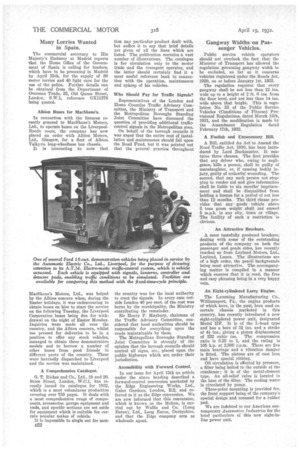A Comprehensive Catalogue.
Page 44

If you've noticed an error in this article please click here to report it so we can fix it.
G. T. Riches and Co., Ltd., 19 and 20. Store Street, London, W.C.1, has recently issued its catalogue for 1932, which is a most voluminous production covering over 750 pages. It deals with a most comprehensive range of components, accessories, garage equipment and tools, and specific sections are set aside for equipment which is suitable for certain popular makes of vehicle.
It is impossible to single out for men tion any particular product dealt with, but suffice it to say that brief details are given of all the lines which are listed. The publication contains a vast number of illustrations. The catalogue is for circulation only to the motor trade and the transport operator, and the latter should certainly find it a most useful reference book in connection with the operation, maintenance and upkeep of his vehicles.
Who Should Pay for Traffic Signals!
Representatives of the London and Home Counties Traffic Advisory Committee, the Ministry of Transport and the Metropolitan Boroughs Standing Joint Committee have discussed the question of providing additional trafficcontrol signals in the Metropolitan area.
On behalf of the borough councils it was urged that the entire cost of installation and maintenance should fall upon the Road Fund, but it was pointed out that the general practice throughout the country was for the local authority to erect the signals. In every case outside London 40 per cent of the cost was borne by the municipality, the Ministry contributing the remainder.
Sir Henry P. Maybury, chairman of the Traffic Advisory Committee, considered that local authorities should be responsible for everything upon the roads maintainable by them.
The Metropolitan Boroughs Standing Joint Committee is strongly of the opinion that the borough councils should control all signs, etc., placed upon the public highways which are under their jurisdiction.
Accessibility with Forward Control.
In our issue for April 12th an article under the above heading described a forward-control conversion marketed by the Edge Engineering Works, Ltd., Gales Gardens, London, E.2, and referred to it as the Edge conversion. We are now informed that this conversion, which is known as the Melton, is carried out by Wallis and Co. (Long Eaton), Ltd., Long Eaton, Derbyshire, and that the Edge company acts as wholesale agent.












































































































